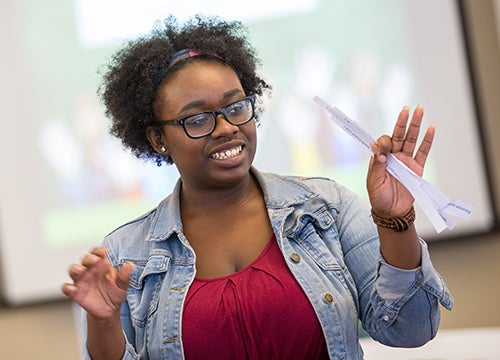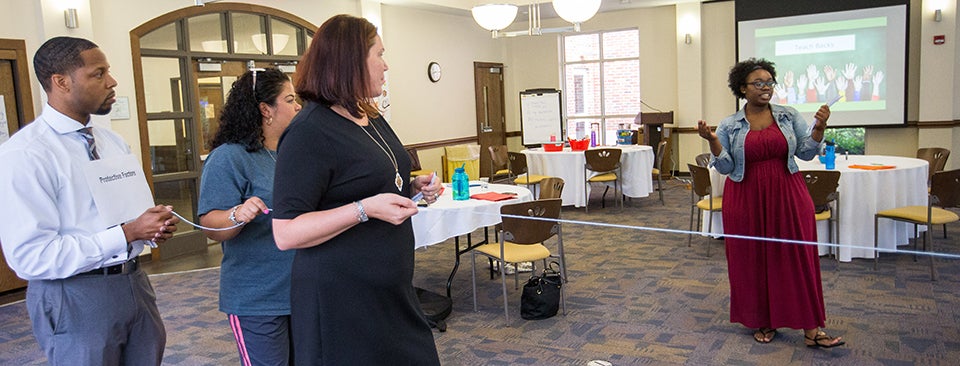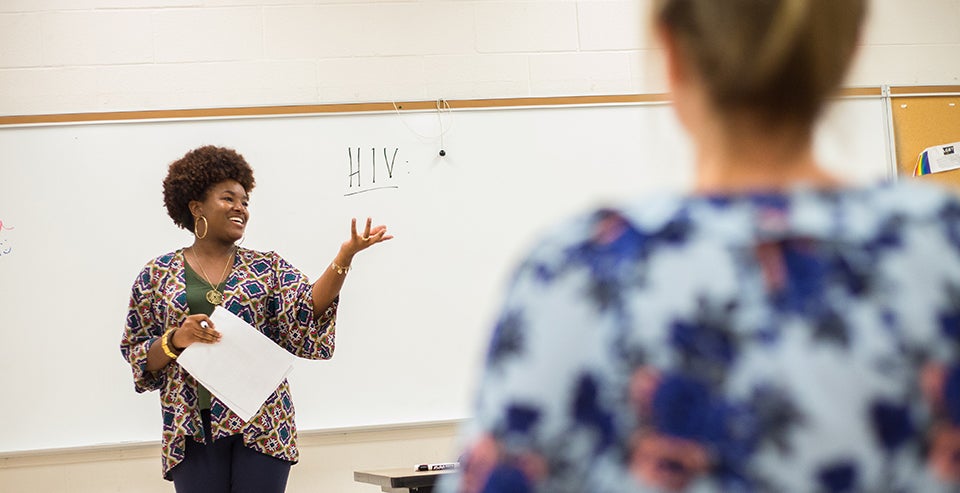NEEDED RESOURCE
Center strengthens health education across the state
As school begins this fall, East Carolina University will play a major role in training health educators in K-12 schools across the state.
For 28 years, the North Carolina School Health Training Center has provided teachers and counselors with the resources they need to teach sensitive topics like bullying, domestic violence, suicide prevention and reproductive health to children and adolescents.
It is the only center in North Carolina that provides trained experts who can facilitate professional workshops for school health educators.
The center was relocated this summer to ECU where Dr. Michele Wallen, associate professor of health education and promotion in ECU’s College of Health and Human Performance, will lead outreach and research efforts. Wallen was named director of the NCSHTC and helped facilitate its move from Appalachian State University.
Wallen has worked with the NCSHTC for more than 10 years and said ECU was a good fit for the center because of its “strong presence in health education and good partnerships with schools.”
The NCSHTC offers between 40 and 70 training workshops across the state each year on topics ranging from nutrition to puberty. The majority of the training is provided to teachers, administrators, school nurses and counselors in school districts, but the center also offers sessions for staff in health departments and community based organizations.
In August, the NCSHTC hosted a Family Life Institute on the campus of ECU where health educators spent three days learning how to meet the needs of all learners and how to become comfortable teaching sensitive and sometimes awkward topics. Participants also practiced the new facilitation skills with their peers to receive feedback.
Jaye Holland, a public health coordinator with the Gaston County Health Department, practiced a classroom activity on preventing sexually transmitted diseases with her peers. In a few weeks, she will lead the same activity with teenagers in Gaston County.
“It helps to see how other people are teaching and it’s a great networking opportunity,” said Holland.
NCSHTC-hosted training offers information on legislation related to health education and professional development using evidence-based practice.
“It’s a good refresher course on sexual education, how to facilitate lessons, and things to keep in mind when dealing with teenagers,” said Tiffany McCullough, who works with teen parents at the Council on Adolescence of Catawba County.

Tiffany McCullough takes her turn presenting a class exercise.
Holland said she was particularly impressed with the session on reaching out to LGBTQ youth. “I feel confident going into a class with LGBTQ youth now and helping them with reproductive health education and questions,” said Holland
In addition to teaching strategies, the center helps educators keep track of the ever-changing requirements in health education. Wallen says part of the center’s success is being able to quickly adapt to new topics that impact youth in North Carolina.
“In the last few years we have received more requests for sex trafficking, bullying and cyberbullying resources to meet legislative mandates,” said Wallen.
The NCSHTC also has adapted to meet the evolving needs of students and teachers by incorporating technology.
“We’re such an information-based society,” said Wallen. “We’ve changed the practice in the classroom – moving away from textbook instruction to a more skills based approach where it’s hands on and applicable to everyday life.”
To reach every part of the state, the center has a group – or cadre – of 20 health educators who go to schools and youth-serving agencies, like Boys and Girls Clubs, to train educators, counselors and health workers. Members of the cadre hold a master’s or doctoral degree and have experience in school and/or public health.
“All the people who serve as trainers have a wealth of knowledge,” said Wallen. “Over the years the recognition of the center as a resource for health education has grown along with our cadre of trainers so we can serve all areas of the state.”
As director, Wallen hopes to increase research by analyzing data that has been collected through years of NCSHTC program evaluations. “I would like to start researching the impact on both teachers and students and monitor best practices and professional development,” she said.
The NCSHTC receives more than $470,000 in grants to fund programs and projects implemented in North Carolina public schools. The center partners with the NC Department of Health and Human Services.

Health educators at the Family Life Institute participate in the class exercise, Tug of Values.
